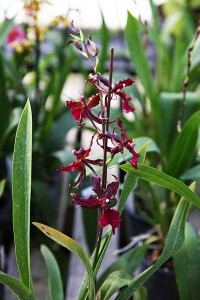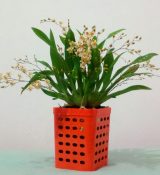A Brief Overview of the Genus Oncidium
Author: Celeste BoothNo Comments
Care and Culture, Classification

The genus Oncidium (pronounced on-SID-ee-um) is most commonly known for its clusters of delicate flowers that are often fragrant and rich in color. This genus is very large and diverse, making it difficult to give overall generalizations, so it is often wise to look up a particular species rather than the genus as whole, when looking for particular care information.
Naming and Distribution
The name Oncidium comes from the Greek word “onkos”, which means “swelling” and refers to the small callus at the base of the lip.
Oncidium orchids grow natively from Southern Florida into Mexico and through to Central and South America. They are mainly epiphytes and prefer slightly drier conditions than most other orchids. Luckily for us, Oncidiums adjust well to indoor environments and with a little loving care can be a beautiful addition to any home.
Plant Identification
Oncidium orchids are characterized by the wort-like formation on their lip (from which they are named), having pseudobulbs with 1-3 leaves, flowers whose petals have wavy edges, and flowers that bloom in shades of yellow, white, red, and pink. Oncidiums are often referred to as spray orchids, because of the raceme’s colorful bursts of flowers. Oncidium orchids range in height, but the Oncidium baueri can reach 5 meters.
General Care Requirements
LIGHT: Oncidium orchids like bright light (anywhere from 2000-6000 foot candles, depending on the variety). East, west, or south windows are good locations for your orchid.
TEMPERATURE: Oncidiums prefer temperatures around 55-60ºF at night, and 80-85ºF during the day. (Higher temperatures are tolerated only if there is good air movement).
WATER: Although watering requirements can vary depending on the type of plant, a thorough watering once the medium is at least half dry is a good rule of thumb.
POTTING: Use medium grade potting mix and repot when your orchid’s has finished flowering and new growth has begun to appear (usually during Spring).


Ask an Expert
Questions about orchids?
Our experts love a challenge!
Photo of the Week
Submit your photo to be featured on the blog!
More Photo of the Week Winners
Submit Photo







